A herd of wild Asian elephants is on a 400-kilometer journey, trumping and tramping through towns and villages, where they are treated like celebrities.

The wandering elephants sleeping in the open. Photo provided to
By GAO Jia
On May 28, telescope to his eye, LIN Ruxiang stood on his balcony surveying a distant hilltop. A herd of elephants grazed peacefully in a clearing. Five days had passed since the herd showed up in Eshan, a small county in central Yunnan Province.
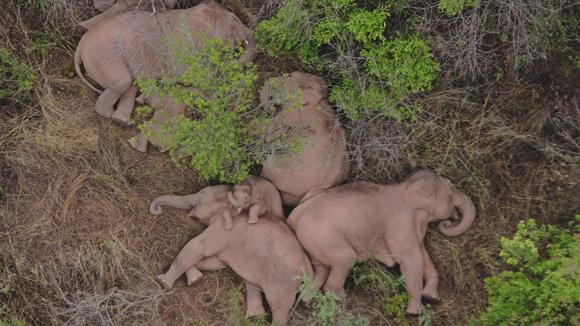
When they first came to town, they took a stroll in the car-repair district, only to be barred from going downtown by a blockade of heavy trucks. A huge crowd had gathered. A police siren wailed and the herd ran for the hills.
A few days later, people were used to the elephants’ daily routine, hanging out in the hills in the morning and heading into town later in the day. They attempted to raid a local liquor factory, but the gate was blocked by buses. They lingered a bit before heading into town. But the trucks were still in the way. Undeterred, the elephants left the paved road and made hay in a cornfield in front of Lin’s house. Half an hour later, when they emerged happily fed, the field was a trampled morass of stalks and leaves, but they were still eager for more fun.
To Lin’s horror, they came back that night, stopping right outside his front yard. One of them plucked a few leaves off a vine in the garden. Apparently unimpressed, the giant foodie nonchalantly pushed open the gate and the dogs, which had been barking like crazy, abruptly fell silent. All was quiet, except for the elephants’ rumblings. From an upstairs window, the family watched the elephant sniff the grapes, raid the kitchen, and, unable to find anything good to eat, romp around in the yard, smashing the poor parrot’s cage.
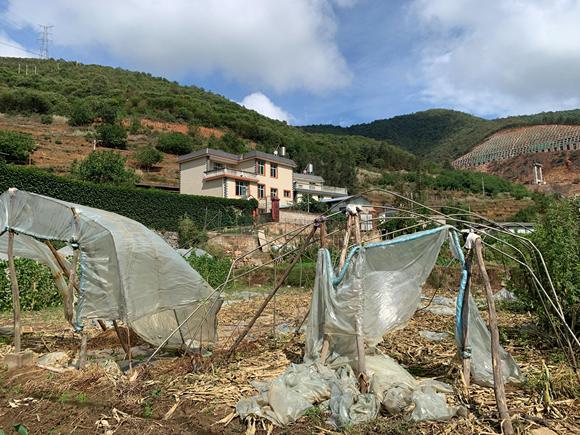
On the way to Eshan, the elephants raided another family and ate their maize. Suffering from PTSD, the family dog didn’t eat for days. Everyone at school was jealous of the teenage daughter: visit by (marauding) elephants is said to be an auspicious sign, though one perhaps best viewed from a distance.
Elephants are regularly sighted in southwest Yunnan, the last refuge for wild Asian elephants in China. The herd – 15 adults and calves and marked by a female with a particularly short trunk – departed Xishuangbanna National Nature Reserve, near the China Myanmar border, last year and have since trekked over 400 kilometers to reach “civilization.”
PENG Guanglong has visited Xishuangbanna twice but didn’t see even a single elephant either time. Although domesticated elephants are commonplace, most locals think of wild elephants as exotic animals to be seen in safari parks. Peng was elated when he saw the elephants drinking from his irrigation pond. Some of his neighbors even took elephant manure home for their vegetable patches. “It’s like winning the lottery!” he said, observing that wild elephants look weather-beaten compared to their zoo-bound counterparts.
By the time the elephants made it to Pang’s village, their odyssey was part of local lore, and many warnings had been sounded. The herd is more active at night when it is cooler, and everyone should stay upstairs when an elephant alert is on. Feeding them or yelling at them, even turning on the lights, are strictly prohibited. Elephants are remarkably easy to provoke, so people can only stand idly by and watch their colossal silhouettes make mischief in the distance.
The elephants are seen as big and slow (which they certainly are not) and sometimes as cute, but one boy who lost his vegetable garden to their incursions said they “stank”. Regardless, almost everyone hoped that the elephants would stay for good. Peng, struck by the size of the crowd that gathered, said it would be “even better than winning a lottery” if the elephants decided to stay, deluded by dreams of easy wealth. “We wouldn't have to work in the fields anymore! I’d just sit at the gate and sell water to the tourists!”
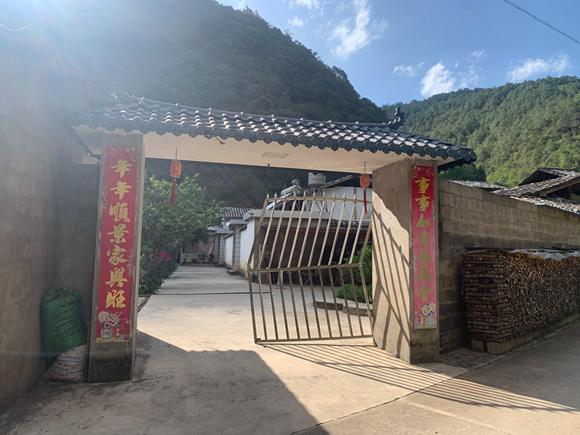
But on the elephants pressed: places to go, things to do. It is unclear what triggered the migration or why they have kept going. Most explanations point to human activity. Rubber plantations and hydropower dams have disrupted their routine. Fast forest restoration may have changed the balance of the local ecosystem and cut off the elephants’ food supply.
Even the boy who said the elephants smelled disgusting couldn’t stop wondering where they were heading. He still visits their former stronghold in the hills sometimes to look for their footprints.
Blissfully oblivious to the villagers’ desires, the herd marched north into Shuanghe on the outskirts of provincial capital Kunming.
Suddenly everyone wanted to go to Shuanghe, but the local police had other ideas and turned people away at the edge of town. A couple who had followed the elephants from Yuxi refused to leave until they were shown droppings, tracks and farm gates broken by the herd. Everything was duly photographed.
This sudden reminder of exotic nature (ubiquitous just a few generations ago), is both shocking and reassuring to urbanizing villages. This at least partially explains the hospitality shown to the herd. In fruit-growing areas, they simply helped themselves to hundreds of acres of fruit, bamboo and grain. Farmers spoke fondly of their persnickety habits. Maize is fine, but only if it’s neither too tender nor too tough. Unripe bananas are gross, but their sweet stems are tolerable. Mangos? No, thank you, but it’s fun to shake the trees and let the fruit rain down.
When the elephants left after a month, the mood was bitter-sweet. “The first day without the elephants. Already missing them,” a local government worker wrote online.

Of course, the visiting crowd had helped the local economy. One viewpoint was so busy during the International Workers' Day holiday that some villagers did indeed start “selling water to the tourists,” just as Pang had predicted.
Shipping, the next town on the route, was overjoyed. “Welcome!” someone wrote on social media: “We have all-you-can-eat berries, dragon fruit, and kiwis. We even have a lake for baths!”
Despite the enthusiasm and extravagance, government agencies have been monitoring the herd nervously. Over time, they have learned to manage risks and control damage. It comes down to block the main streets and use food as bait to keep them away from populated areas, but accidents still happen.
In the village of Miduxi, without warning, elephants appeared a backyard and began dismantling a motor tricycle. The family scrambled to the second floor where they listened to the havoc below. An elephant in the living room smashed the TV and tipped over a jar of liquor. It didn’t drink any, but happily devoured a bag of salt and a box of laundry detergent. In another village, a woman had five tons of pig feed in her backyard, delighting the appreciative elephants. “By the time the alarm was raised, half the feed was gone,” she said. Not entirely without manners, the herd had the courtesy to leave a few hundred kilograms for their hostess.
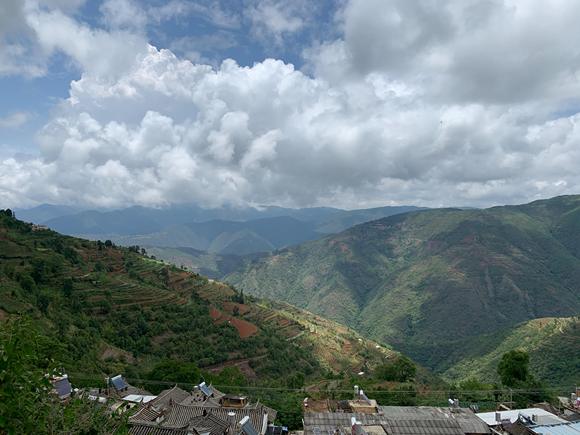
Before the elephants enter a town, workers scatter fruit on an arranged route leading to the forest, while townsfolk wait quietly until the alert is over. Villagers must not provoke the elephants. They are very intelligent and have proverbially long memories. An old man once shooed a calf away from his yard (he was immediately dragged inside by a village official), only to have his storeroom stormed a while later by a group of angry adults.
In most places, the herd passed without incident but tracked 24/7 by 14 drones, hundreds of heavy vehicles and more than 600 firefighters. Before the elephants entered a town, workers scatter fruit on a route leading into the forest, while the townsfolk wait until the alert is over.
People love it when the elephants come to town. “If I had known that I would one day see them in my own backyard, I wouldn’t have paid to go to Xishuangbanna!” an old man said.
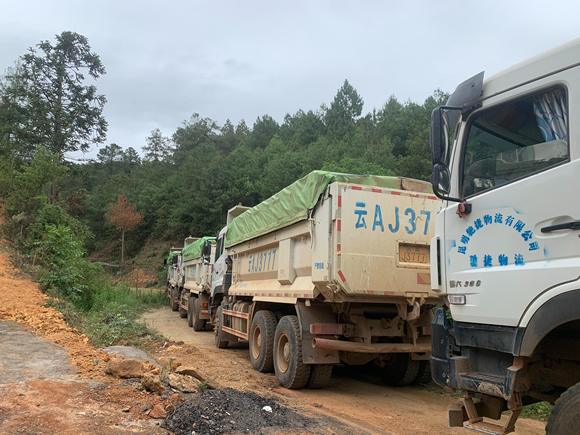
The odyssey has been closely followed across the country. Videos of elephants strolling in town went viral, as did memes of elephants doing bizarre things, often with captions and music that anthropomorphize their behavior. But not everyone is a fan.
When the herd passed RONG Guifang’s village, one of the earliest on the route, people were still new to dealing with them and despite warnings, Rong slept downstairs. One night, she awoke to a loud bang on the door and was greeted with a tusk right in front of her eyes. The head of the beast was wider than her bedroom door. She thought she was going to die. Her husband told her not to make a sound, but by then she was too frightened to say anything. After what seemed like an eternity, the elephant squeezed itself out of the front door, and Rong, still shaking, was dragged upstairs by her husband.
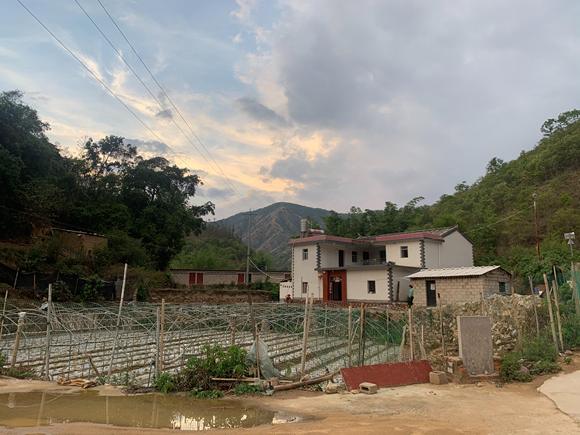
A relative uploaded the security camera footage online. It was watched over 90,000 times, with hundreds of comments congratulating Rong on the auspicious visit. The next night, Rong hid in her upstairs room. She had come closer to the beat than anyone could dream of. It was a moving experience. But thank you, not again.